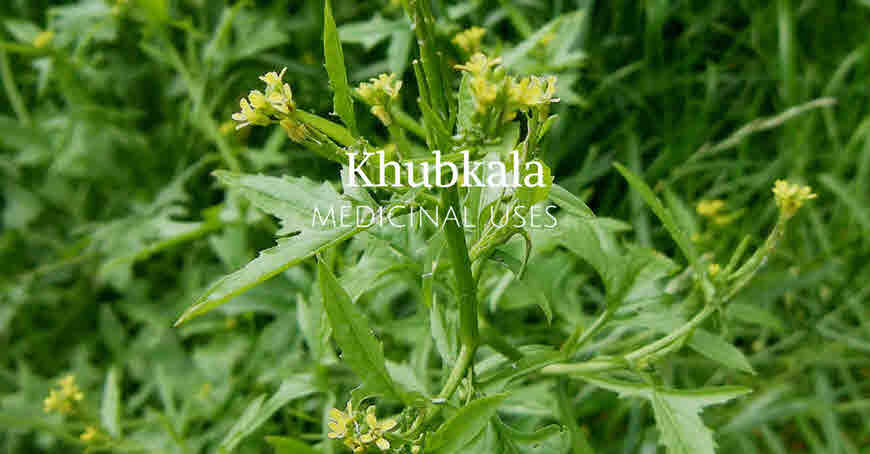Khubkalan or Jangli sarson is the seed of the plant Sisymbrium irio Linn. belonging to family Brassicaceae. This plant is generally found as an annual or biennial herb in moist soil. In India it is grown in Kashmir, Punjab, Haryana and from Rajasthan to Uttar Pradesh. It is also found in many parts of the world. The English name of this plant is London rocket. It got this name when it became abundant in London after the Great Fire of London in 1666. It is also distributed in Arab, America, South America, Europe, North Africa and Australia.

Khubkalan is the Unani-tibb name of the plant. Unani/Yunani medicine is a form of traditional medicine practiced in countries of the Middle East and South Asia. In Unani, the seeds of the plant are prescribed for treating coughs, chest congestion, fever, asthma, loss of voice, etc. It is also indicated in typhoid, rheumatism, to detoxify the liver and spleen, reduce swelling/inflammation, rheumatism, clean wounds and piles. Its description is not found in ancient classical Ayurvedic texts. Khubkalan seeds have pungent taste and appearance is like mustard plant. It leaves are edible.
General Information
Common names
- ENGLISH: Hedge-Mustard, London Rocket, Desert mustard
- HINDI: Khub Kalaan, Khaaksee, Khaaksi, Khubkala
- MARATHI: Ranteekhee
- PUNJABI: Jangli sarson, Maktrusa, Maktaroosaa
- TELUGU: Jeevakamu
- URDU: Khubakalan, Khaksi, Khaksir, Khub Kalan, Shaba
- UNANI: Khubkalan, Khubkalon, Khaksi
- TIBBI NAME: Khub Kalan
- ARABIC: Jalijan, Khakshi, Khubba
- DENMARK: Esdragon
- SPANISH: ireos, matacandil, oruga leonina, rabanillo amarillo
- SWEDEN: Ampelskara, Dragon, vallsenap
Scientific Classification of Sisymbrium irio ( Khubkalon)
- KINGDOM: Plantae
- PHYLUM: Spermatophyta
- SUBPHYLUM: Angiospermae
- CLASS: Dicotyledonae
- ORDER: Capparidales
- FAMILY: Brassicaceae/Cruciferae (Mustard family)
- GENUS: Sisymbrium
- SPECIES: Sisymbrium irio
Part used: Seeds
Habitat: Kashmir, Punjab, Haryana and from Rajasthan to Uttar Pradesh in moist soils.
DESCRIPTION
Annual or biennial plant reaches 50-80 cm or taller;glabrous or sparsely pubescen;Stems erect, branched proximally and distally, glabrous or sparsely pubescent at least basally;Basal leaves not rosulate;petiole;blade oblanceolate or oblong (in outline);margins runcinate to pinnatisect;lobes oblong or lanceolate, smaller than terminal lobe, margins entire, dentate, or lobed;Cauline leaves similar to basal;distal-most blade smaller, to 2 cm wide, margins entire or 1-3-lobed;Fruiting pedicels divaricate or ascending, slender;Flowers: sepals erect, oblong;petals oblong-oblanceolate;Fruits narrowly linear, straight or slightly curved inward, slightly torulose, slender;ovules 40-90 per ovary;
Seeds more or less ellipsoid, minute, size about a mm, orangish-brown, mucilaginous with warty surface. They have odour, pungent like mustard oil and taste like bitter mustard oil. The powder of seeds are brown, with pungent mustard oil smell and oil globules;aleurone grains containing crystalloids, globoids and sclerenchymatous cells;with ruthenium red mucilage turns pink.
Pharmacological Properties of Seeds
- Expectorant: promotes the secretion of sputum by the air passages
- Anti-tussive: suppress coughing
- Restorative: restores normal health
- Febrifuge: reduce fever
- Rubefacient: topical application produces redness of the skin;useful in pain
- Antibacterial: destroys bacteria or suppresses their growth or their ability to reproduce जीवाणुरोधी
- Aphrodisiac: Having the effect of increasing sexual desire
- Cardio tonic: tonic effect on the action of the heart
Constituents of Seeds
Seed contains a flavonoid, isorhamnetin. Fatty oil from seeds contain linolenic and oleic acids (as chief constituents), along with erucic, palmitic and stearic acids. Ethanolic extract of seeds exhibited marked antibacterial action, also antipyretic and analgesic effects.
Ayurvedic Properties and Action on body
Khubkalan seeds are pungent in taste. They are sticky due to the presence of fatty oil. They are hot in potency and heavy on digestion.
- Rasa रस (Taste): Katu (pungent)
- Guna गुण (Characteristics): Guru/Heavy, Snigdha/Unctuous, Picchila (sticky)
- Virya वीर्य (Potency): Ushna/Hot
- Vipaka विपाक (Post Digestive Effect): Katu/Pungent
Action on body:
- Vata har (pacifies the Vata/wind) वातहर
- Kapha har (pacifies the Kapha/mucous) कफहर
- Sweadkar (Sweat causing) स्वेदकर
- Shothahara (Anti-inflammatory) शोथहर
- Balya (Strength promoter) बल्य
Therapeutic Uses of Seeds Powder
- Asthma, cough
- Fever, hoarseness of voice
- Diseases due to vitiation of vata
- Diseases due to vitiation of kapha
- Weakness
The Dosage of the Seed powder:3-6 g.
Various Medicinal Uses of Khubkala
In treatment of piles the seeds of the plant are dried and powdered. This powder is taken in dosage of 5gm twice a day for three weeks.
- The decoction of seeds are given in case of measles and smallpox.
- For fever the seeds are boiled and given.
- The seeds are administered internally with rose water in cholera.
- In diarrhea, the seeds are given with leaves of Kaasni.
- Externally seeds are used as stimulating poultice.
The leaves of the plants are also edible. They can be eaten as salads. They are rich in protein. Leaves also contain vitamins, minerals, fiber and carbohydrates. They contain about 82% moisture, 7% protein, 0.4% fiber, 8% carbohydrate, minerals (calcium, phosphorus, iron), and vitamins (vitamin A/beta-carotene and C).
The infusion of leaves is used in the treatment of respiratory ailments, throat affections, cough, and loss of voice.
Sir I have low grade fever in the evening daily since last two months. Pls tell how to use khoob kala as medicines. How much days I have to use it.
Pls advice.
Typhoid fever
I have personally really good experience in chest congratulations and old fever and khansi during corona time.
I suggest to all take tea of 1/2 spoon khoobkala and punch of ajwain and punch of kali mirch at sleeping time.
It’s amezing results
It also eliminates bone fever, I hv personal experience
How did you use…?
I have seen its impact only in one doses in fever . It’s really magical
Have seen the impact of suppressing cough with khoobkala and it was impressive. We always keep the seeds at home to use in fever or cough
medicinal use of Khub Kalan oil be also illustrated
how Khubkalan seeds be used for fever to children